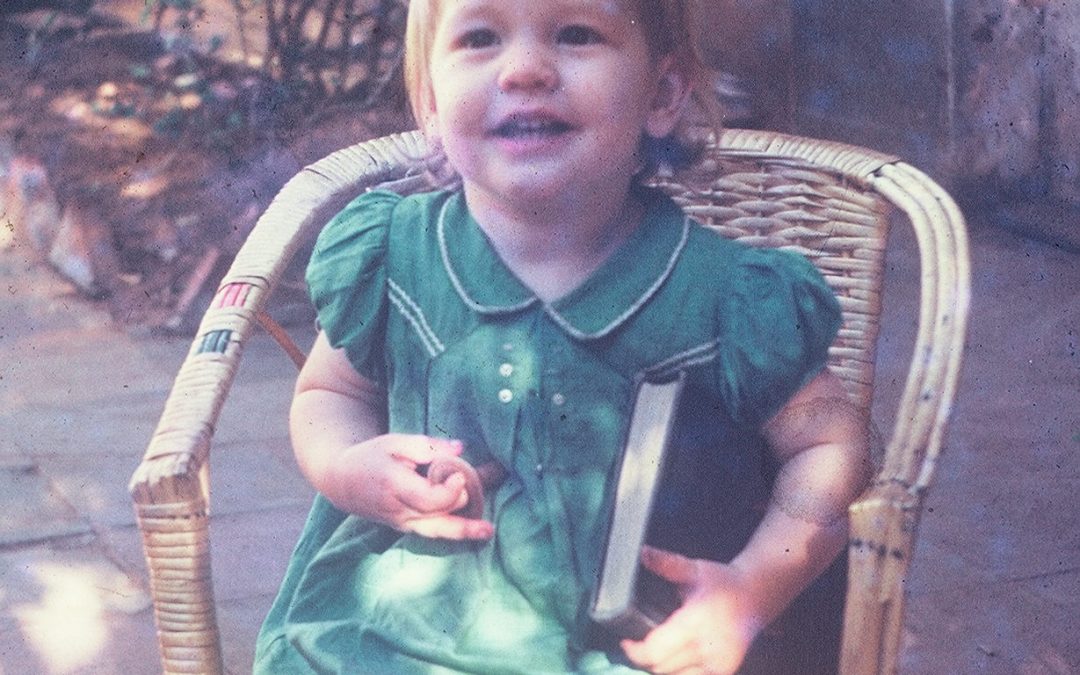I’m an innocent child holding my pacifier in one hand. In the other hand, I’m grasping an adult-sized black book — possibly titled “The Art of Hiding Parts of Myself?”
- ·When I was a child, I hid my deepest shame and fears — mostly about innocent things like wetting my bed.
- When I was a teenager, I hid behaviors my parents and my Mennonite church would never condone.
- By the time I was a young adult, hiding the parts of myself I didn’t want others to see became second nature.
I learned the art of hiding at a very young age. In my family, we never talked about the bad stuff that we didn’t want others to know about. We were a good and upstanding Mennonite family. And the truth is, mostly we were. But most assuredly, sometimes we were not.
My family and I were not the only ones with this flawed habit. In a study published in the Journal of Personality and Social Psychology, researchers analyzed over 13,000 secrets. On average, each person in the study kept at least thirteen secrets from the list. And at least five of them were ones they’d never told anybody.
The most common secrets:
60 per cent — a lie or financial impropriety
47 per cent — a violation of trust
33 per cent — theft, a hidden relationship, or discontent at work
If this weren’t so sad, it would be almost humorous. We’re a world full of people hiding behind our secrets.
Why Do I Hide Parts of Myself?
Writing in the HuffPost, Elena Brower reports that the number one reason people keep secrets or tell lies is to keep the peace or not rock the boat. This suggests that I hold onto my secrets to make sure I keep other people happy and secure in their current view of me.
What Brower writes may well be true, but I don’t believe it gets to the real core of the matter. I hid parts of myself when I was younger to “not rock the boat.” Of course. But I think the important question is: Why did I want to not rock the boat?
Shame and fear.
I believe it has always been my shame for what I have done, and/or my fear of not being loved or accepted for doing it, that has driven my need to hide parts of myself from others.
What Happens When I Hide Parts of Myself?
I find it not at all surprising that the shame and fear I kept hidden about innocuous and harmless childhood mishaps, when they remained wrapped up secretly and securely within me, triggered a deep-seated pattern of hiding. And each additional layer of secrets built up a stronger armor to hide my growing internal tension between my true self and the one I presented to others.
Research supports my conclusion. Our secrets weigh on us, even when there’s little danger that they’ll be uncovered. The bigger and uglier the secret, and the more intensely I hold it tightly within me, the higher the resulting anxiety and stress. The study further reports that when I’m distracted by a secret, I’ll judge whatever tasks lie in front of me to be more arduous than they actually are. And as I become increasingly aware that I’m not living in accordance with my authentic self, my overall well-being plummets.
The evidence is clear: The many secrets in my young life were like a cancer that would have gradually killed me, if I hadn’t finally cut them out and freed myself of them. Like Jean-Paul Sartre said, “Every word has consequences. Every silence, too.”
My new book Love is Complicated: A True Story of Brokenness and Healing, reveals secrets some of my family members would rather keep hidden. I’m convinced that doing so would inhibit the healing that is possible.
My guest on this week’s podcast, Misty Griffin, joins me to tell her true story of some of the nasty secrets hidden beneath the holy trappings of one Amish community. Misty escaped the cruelty and is here to tell her story. She inspires us to stand up for and be committed to protecting women and children from abuse.
For me, her story is also an invitation to continue to look deep within myself, to open up any musty old corners that may still be hiding parts of myself out of fear or shame. Not because I’m proud of those parts of me. Of course, I am not. But because holding them captive will erode my ability to accept and love myself, which will only diminish my capacity to compassionately accept and love those around me.


Marlena points out that when we are not living in accordance with our authentic selves, our secrets weigh on us, tasks look more difficult, and our overall well-being plummets. While this argues clearly for the need to be ruthlessly honesty with ourselves it also suggests the importance and blessing of having at least one person in our lives whom we allow to authentically know us deeply.
Thank you for being my person!